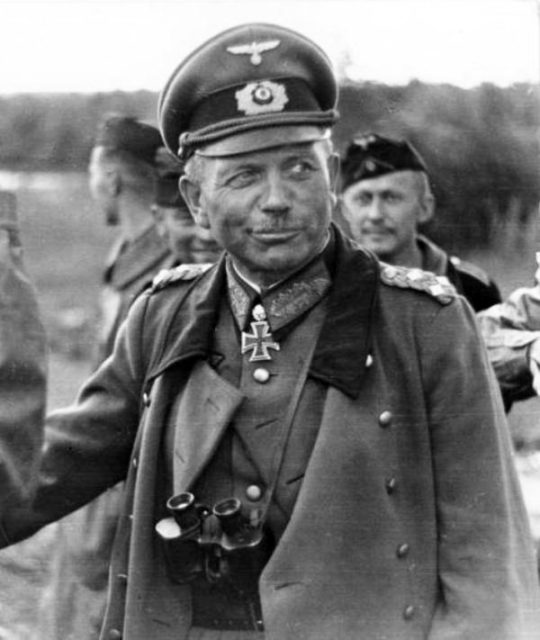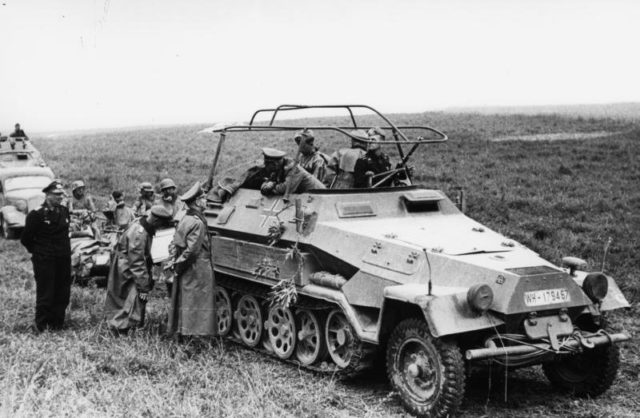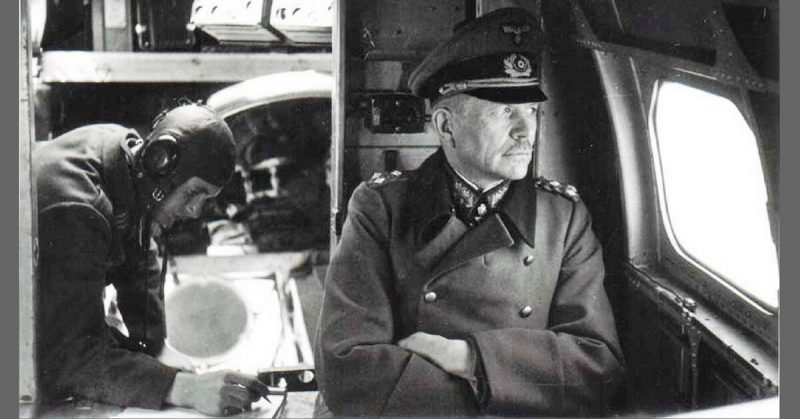General Heinz Wilhelm Guderian was one of the most innovative military commanders of the 20th century. He helped to develop modern tank warfare, bringing success for Nazi Germany in the early stages of the Second World War. He was also a man of integrity, one of the few who successfully stood up to the madness of Adolf Hitler.
The First World War
Born in 1888, Heinz was a junior officer in the German army when the First World War broke out. Working in signals, he gained experience with this new technology and with working in a command center. During the war, he completed his training to be a staff officer.
In the late stages of the war, Guderian saw the effect of British tanks as they drove back the Germans. It was a sight that would shape his future career.
Developing Tank Warfare
In the years after the war, Guderian aligned himself with officers who steered clear of politics while trying to rearm Germany within the limits of the Versailles agreement. For Guderian, this meant tanks. His tactics were based initially on those of British thinkers Fuller and Liddell Hart. He cooperated with the Russians and Swedes in pushing the potential of tanks forward.
One concern for Guderian was communication between tanks. Using his signals experience, he helped develop methods of secure radio communication to allow coordination between tanks in battle.
Working Under Hitler
As Hitler rose to power and then tightened his grip, the army became divided. Old-fashioned career soldiers came into conflict with the rising Nazis.

Guderian straddled the gap. Despite his reservations about Germany’s new leadership, he worked increasingly closer with Hitler.
Failed experiments with tanks in Ethiopia and Spain meant that, despite his closeness to the regime, Guderian struggled to push his agenda.
Czechoslovakia
In 1938, Guderian commanded XVI Corps in taking control of the Czech Sudetenland for Germany. This success bolstered his enthusiasm for Hitler. Like many ordinary Germans, Guderian saw the Fuhrer as the bearer of prosperity for their country, a man throwing off the injustices of Versailles.
Poland
Guderian was put in charge of XIX Corps, a combination of tanks and motorized infantry, for the invasion of Poland. Leading from near the front, he kept his men motivated and pushed swiftly forward. He noted deficiencies in the vehicles, had them quickly remedied and learned much for the future. He also showed what highly trained and well-led troops could achieve, as he quickly took out the garrison at Brest-Litovsk.
Challenging Hitler
Following the fall of Poland, many German army commanders feared what would happen next. They nominated Guderian to speak to Hitler on their behalf. He voiced their concerns that an invasion of France would be a mistake. His integrity and the respect Hitler held him in allowed him to express dissent without being punished. However, Hitler’s mind was made up.
The years that followed gave Guderian much cause to doubt Hitler. As the Fuhrer raged at army commanders for their half-hearted support, and as further war became inevitable, Guderian saw his leader’s irrational side. It was a face of Hitler that Guderian would repeatedly and bravely stand up to.
France
Guderian led an armored formation in the 1940 invasion of France. His swift advance isolated the British at Dunkirk, forcing their withdrawal from the continent. It was achieved despite high-level meddling which held Guderian back.
After Dunkirk, he turned south, cutting off French forces around the Maginot Line. His tanks had proved their worth, outshining the expectations of both sides.
Into Russia
Shifted east, Guderian was in command of nine divisions for Operation Barbarossa, the invasion of Russia. Once again, he thought the plans of his superiors deeply flawed but did his best to fulfill them.
Guderian made such decisive advances that one of his Russian opponents was executed for his failures. Guderian himself was threatened with court-martial as he worked around superiors and their disagreements to pursue his goals.
Inspiration Among Anarchy
Winter, Soviet resistance, and the new Russian T34 tank all added to the challenges of Barbarossa. As the German advance wavered, Guderian did his best to keep up the morale and advances of his army group. He continued to lead from near the heart of the action, winning the loyalty of his men. After the fall of Kiev, he reorganized and resupplied his troops in ten days, an administrative achievement as significant as his tactical victories.
Dismissal and Return
As the advance disintegrated, Guderian visited Hitler. He tried to talk sense to the Fuhrer, but all his evidence and reasoning, his talk of frozen ground and short supplies, was worth nothing. The operation continued.

On December 26, 1941, after also clashing with his superior von Kluge, Guderian was relieved of duty.
After a year of idleness, Guderian was recalled in February 1943. As Inspector General of Armoured Troops, he answered to Hitler for all aspects of tank warfare. He helped to increase production as Germany struggled against the turning tide of the war.
A Voice of Sanity in the Falling Reich
In the final two years of the Second World War, Guderian continued to clash with Hitler. Among other disagreements, he futilely suggested that the Fuhrer hand military command back to an experienced general. The controlling Hitler would not let go.
Despite this, Guderian resisted attempts to draw him into plots against Hitler. To the last, he remained an apolitical professional.
In March 1945, after a bitter row with Hitler, Guderian went on sick leave. He then joined a Panzer unit, before being captured by the Americans. After three years in captivity, he retired to write his memoirs and complete a book on tank warfare. He died in 1954.
Guderian was one of the great tank leaders and innovators in his field. He was a man of integrity who risked his life arguing with Hitler, and who managed to fight for Germany while staying clear of Nazi atrocities. He was a remarkable man in terrible times.
Source:
Richard Holmes, ed. (2001), The Oxford Companion to Military History.
David Rooney (1999), Military Mavericks: Extraordinary Men of Battle.
